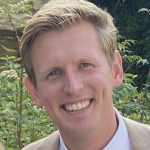Kettingbrief
Verhaallijn 1 31-12-2022
editie 4 | jaargang 10
What has your career been like so far?
After graduating, I started working at ASML as a Business Engineer. For the first four years I had this role in the Netherlands. One year ago, I moved to the US on a long term assignment to build a similar Business Engineering team in our factory in Wilton, Connecticut. My team’s goal is to make decision making in the factory more data driven. We do this by building capacity models and data visualizations and providing data-driven advice to our management. A typical OML role, I would say. Although, arguably, the actual main goal of my role is to bring some Brabantse gezelligheid to the US.
Why did you choose the industry you work in now?
Well, during my studies I repeatedly have said that I never wanted to work at ASML. My assumption was that ASML already had enough smart people working for them and gave relatively simple roles to overqualified university graduates. During my job search, I found out those roles do exist, however there are many more interesting and challenging roles in ASML for Industrial Engineers. I like the fast pace of working in a factory, especially at a company that is impacting the world. Furthermore, it is a growing company in the growing semiconductor industry, which means there are plenty of opportunities to grow and get your ideas into practice. By the way, more than five years later my friends and family still like to remind me every now and then of me saying I never wanted to work here.
Where do you get the most energy from during and after your work?
At work, three things: making impact, learning new things, and working with a team. I get energy from the tangible impact of my team on decisions in our factory. The steepness of the learning curve is a key driver for me when I choose what to work on. On working with a team, one of the things I learned in this role is that often the most effective way to get work done or solve a problem is simply putting people together in a room from different departments, who often don’t talk to each other that much. Next to that, I found out this year it gives me a lot of energy to be able to build a team from the ground up. After work, as a typical Dutch guy from my age I like riding my road bike. Besides that, reading fiction, business books and biographies and occasionally writing, which helps me to structure my thoughts.
What is the key thing that you have learned during your studies that you use a lot and appreciate?
The helicopter view (or birds eye view): the ability to elevate yourself over a process or a problem. On study materials, the factory physics book is one of the few study books that comes in really handy at work. The committees I did for Industria also formed me: a full-time board year, organizing multiple events and writing articles and columns for SCOPE!
What advice would you give current students?
Don’t take yourself too seriously and try to enjoy this great phase in your life.
You can change a question, which one would you change and why?
Old question:
Why did you choose the industry you work in now?
New question:
Which course would you add to the IE curriculum to setup students for success?
Why:
Looking back, I think a lot of the courses prepared us as students for a potential career in academics, not so much for working in a big company.







